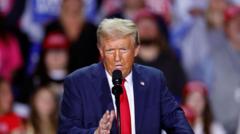In a move signaling his intent to resolve the TikTok situation, President-elect Donald Trump has requested that the US Supreme Court delay the impending ban on the popular social media app. His legal team submitted a brief arguing against the ban, requesting the Court to push back the enforcement date set for January 19. This date is critical as it falls just one day before Trump assumes the presidency. Trump's attorney emphasized that the former president "opposes banning TikTok" and wishes to explore political solutions to the matter.
The context of this legal maneuver centers around a US law mandating the Chinese parent company of TikTok, ByteDance, to divest its ownership to an American company or face an outright ban. This legislation arises from concerns about ByteDance's ties to the Chinese government, a claim the company has consistently denied. Following Congress's enactment of this bill, which was later approved by President Joe Biden, TikTok has filed several legal challenges, asserting that the law infringes on American free speech rights, yet has seen limited success in the courts.
The Supreme Court, while previously refusing emergency injunctions against the law, has consented to hear the case on January 10, just days before the potential ban takes effect. This upcoming hearing pits several interests against one another: national security claims by US officials, the quest for free speech protections by TikTok, and now Trump's efforts to navigate the political landscape post-inauguration.
In filing this request, Trump remarked on the complex interplay between free speech and national security, noting the unprecedented challenge posed by this situation. The implications of delaying the ban may provide the former president with a window to negotiate a resolution without needing immediate legal action.
In response to the situation, the US Department of Justice contends that TikTok's association with China presents a significant national security risk, a sentiment echoed by numerous state attorneys general advocating for the law's enforcement. A recent federal appeals court upheld the legislation, highlighting its bipartisan foundations.
Trump has notably expressed a fondness for TikTok, correlating its popularity among younger voters with his own electoral appeal during his presidency. However, this public sentiment contrasts with many young voters’ support for his political opponents, raising further questions about the future of TikTok in the US political landscape.
The context of this legal maneuver centers around a US law mandating the Chinese parent company of TikTok, ByteDance, to divest its ownership to an American company or face an outright ban. This legislation arises from concerns about ByteDance's ties to the Chinese government, a claim the company has consistently denied. Following Congress's enactment of this bill, which was later approved by President Joe Biden, TikTok has filed several legal challenges, asserting that the law infringes on American free speech rights, yet has seen limited success in the courts.
The Supreme Court, while previously refusing emergency injunctions against the law, has consented to hear the case on January 10, just days before the potential ban takes effect. This upcoming hearing pits several interests against one another: national security claims by US officials, the quest for free speech protections by TikTok, and now Trump's efforts to navigate the political landscape post-inauguration.
In filing this request, Trump remarked on the complex interplay between free speech and national security, noting the unprecedented challenge posed by this situation. The implications of delaying the ban may provide the former president with a window to negotiate a resolution without needing immediate legal action.
In response to the situation, the US Department of Justice contends that TikTok's association with China presents a significant national security risk, a sentiment echoed by numerous state attorneys general advocating for the law's enforcement. A recent federal appeals court upheld the legislation, highlighting its bipartisan foundations.
Trump has notably expressed a fondness for TikTok, correlating its popularity among younger voters with his own electoral appeal during his presidency. However, this public sentiment contrasts with many young voters’ support for his political opponents, raising further questions about the future of TikTok in the US political landscape.

















